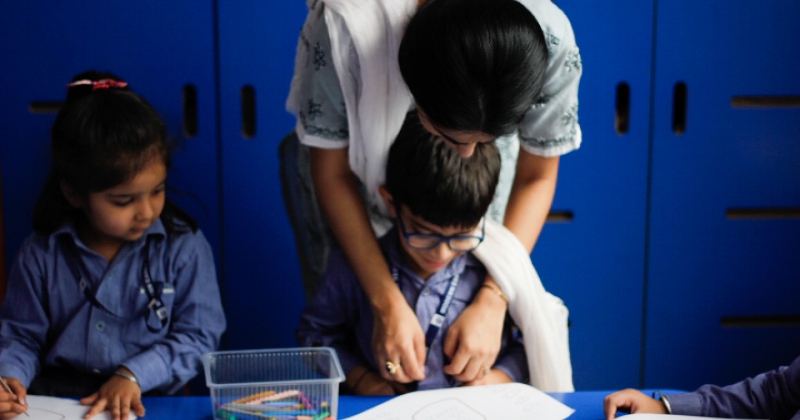
Why Empathy Matters More Than Ever
In a world that is becoming increasingly fast-paced and digitally driven, emotional intelligence is more important than ever. At Modern School Early Years, Deepali, we believe empathy, the ability to understand and share the feelings of others, is a foundational skill that children should develop early in life.
Kids raised in protected spaces and coming from privileged backgrounds are always on the brink of growing snobbish if they are not conditioned to be empathic while growing up.
Empathy not only helps children build stronger friendships and resolve conflicts peacefully, but it also nurtures kindness, tolerance, and responsible citizenship. But how can parents raise empathetic children in today’s competitive and often self-focused environment?
Here are some evidence-based, practical strategies that parents can begin using from the early years.
1. Model Empathy at Home
Children learn most by observing the adults around them. If we want our children to be empathetic, we must model empathy in our everyday actions. Show kindness to others, especially in front of your child. Express your own feelings using “I” statements: “I feel sad when someone is left out.” Respond empathetically to your child’s emotions, even when they’re upset or misbehaving.
At the Best Playschool in Delhi, our educators consistently model respectful, empathetic communication, reinforcing these behaviors daily.
2. Teach Emotional Vocabulary
Young children often struggle to express what they’re feeling, which can lead to frustration or acting out. Giving them the words to describe emotions is the first step toward empathy.
Label your child’s emotions: “You look really happy today!” or “It seems like you’re feeling upset.” Use storybooks or cartoons to discuss how characters might be feeling. Ask open-ended questions like, “How do you think she felt when that happened?”
The better children understand emotions in themselves and others, the easier it is for them to respond empathetically.
3. Encourage Perspective-Taking
Empathy grows when children are encouraged to see the world through someone else’s eyes. Role-play different social scenarios. For example, “What would you do if your friend was crying?” After a disagreement, gently ask, “How do you think your friend felt?” Read diverse books and discuss different life experiences to expand their understanding of people different from themselves.
At our Deepali campus, we use a variety of interactive and play-based learning strategies to help children imagine and understand others’ experiences
4. Celebrate Acts of Kindness
When children show kindness or concern for others, it’s important to acknowledge and celebrate it. This reinforces the idea that empathy is valuable and appreciated.
Praise specific behaviors: “It was so kind of you to share your toy with your friend.” Create a family “kindness jar” where everyone adds a note when someone does something thoughtful. Encourage community service or simple acts like helping a neighbor or feeding stray animals.
These small moments build a lifelong habit of caring and compassion.


5. Set Boundaries with Compassion
Teaching empathy doesn’t mean letting children get away with everything. In fact, setting clear limits with kindness helps children feel secure and learn how to respect others. Use calm, empathetic discipline: “I understand you’re angry, but hitting is not okay.” Help children reflect on the impact of their actions. Focus on problem-solving rather than punishment.
At the Best Nursery in Pitampura, we promote positive discipline strategies that help children grow socially and emotionally, not just academically.
6. Use Daily Routines to Practice Empathy
Empathy can be integrated into daily routines and conversations. You don’t need elaborate lessons, just intentional moments. During meals, ask: “What made you smile today?” or “Did anyone at school seem sad?” Encourage children to help with chores or assist a sibling. Practice gratitude by regularly discussing what you’re thankful for.
These habits build emotional awareness and a sense of connection within the family.
7. Limit Exposure to Negative Influences
Children absorb behaviors from everything they watch and hear. Be mindful of the content they consume and the environments they are exposed to.
Choose books and media that promote cooperation, diversity, and compassion. Address bullying, teasing, or exclusion when it happens, even subtly. Surround children with caregivers, teachers, and peers who value emotional intelligence. Our campus in Deepali ensures a safe, inclusive, and nurturing space where empathy is woven into our curriculum and classroom culture.
Raising the Next Generation of Kind Leaders
Raising empathetic children isn’t about creating perfection; it’s about nurturing connection, compassion, and understanding. At the Modern Early Years play school in Delhi, we work hand-in-hand with parents to create a nurturing environment where children learn not just academics, but life skills that shape who they become.
Empathy is not a trait children are simply born with; it’s a skill that grows with time, patience, and positive guidance. By modeling, teaching, and reinforcing empathy every day, you are giving your child a gift that will benefit them and the world for a lifetime.
Ready to Learn More?
To discover how our early years programme nurtures empathy, creativity, and confidence, book a visit to Modern School Early Years, Deepali today. We’d love to show you how our approach supports the emotional and social development of every child.